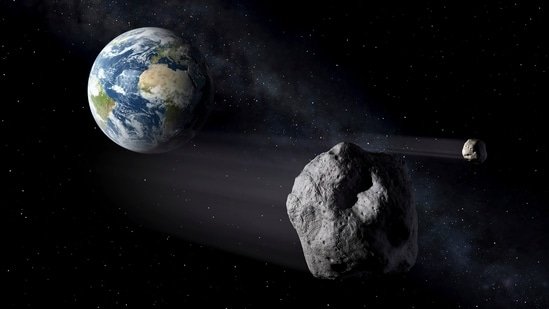Experts recently revised their previous statements regarding data about the collision course of a colossal asteroid dubbed ‘God of Chaos.’ Overturning older claims that 99942 Apophis wasn’t headed towards Earth, Canadian astronomer Paul Wiegert’s new study indicates that the asteroid’s trajectory could unexpectedly change in a dramatic turn of events even if a “small object” crashes into it.

Now that the ‘God of Chaos’ level threat has surfaced again, it is also to be noted that experts previously anticipated it almost coming into contact with our dear planet (no closer than 18,300 miles) on the dreaded date, Friday the 13th – April 13, 2029.
What are the odds of the giant asteroid impacting Earth?
Discovered in 2004,99942 Apophis was initially believed to have a 2.7% chance of impacting Earth in 2029. Although subsequent observations also ruled out the eventuality of the cosmic incident even in a year as late as 2036, Wiegert’s new findings have substantially launched an ominous warning.
Also read | 1st human-made meteor shower: How a NASA mission could make the impossible possible
The Daily Star quoted his scientific explanation earlier this week: “The odds of an unseen small asteroid deflecting Apophis enough to direct it into a collision with Earth in 2029 (d ≳ 3.4 m, Δv > 5 × 10−2 m s−1) are approximately 10−8.”
Nevertheless, the astronomer also highlights the likelihood of the impending ‘God of Chaos’ catastrophically crashing into Earth is less than one in two billion.“Given that only 5% of such impulses are in the correct direction to generate an Earth impact, the overall probability of a small impact directing Apophis into a collision with the Earth is less than one in two billion.”
For those still wondering what is what, Google Gemini clarifies that for the asteroid’s trajectory-changing course, the distance “d” must be at least 3.4 metres or more and the change in velocity “Δv” must be greater than 5 × 10−2 meters per second.
The ‘God of Chaos’ Apophis has been “largely unmonitored by telescopes since May 2021 and will remain so through 2027,” Wiegert added. This is because of “the relative geometry of Apophis, Earth, and the Sun, which puts the asteroid in the daytime sky for the time span in question.”
Also read | Asteroid strikes Earth’s atmosphere, burns up in fireball over Philippines. Watch
More about Apophis asteroid
NASA described Apophis as a “near-Earth object (NEO) estimated to be about 1,100 feet (335 meters) across.” At the time, it was “identified as one of the most hazardous asteroids” that could impact our planet. However, a radar observation campaign in March 2021 overruled the threat, with astronomers concluding that no such risk was in sight for at least a century.
Addressing an initial potential 2068 impact, Davide Farnocchia of NASA’s Center for Near-Earth Object Studies said in 2021, “A 2068 impact is not in the realm of possibility anymore, and our calculations don’t show any impact risk for at least the next 100 years.”
In ancient Egyptian mythology, the asteroid’s cosmic moniker takes after the demon serpent, personifying evil and chaos.
